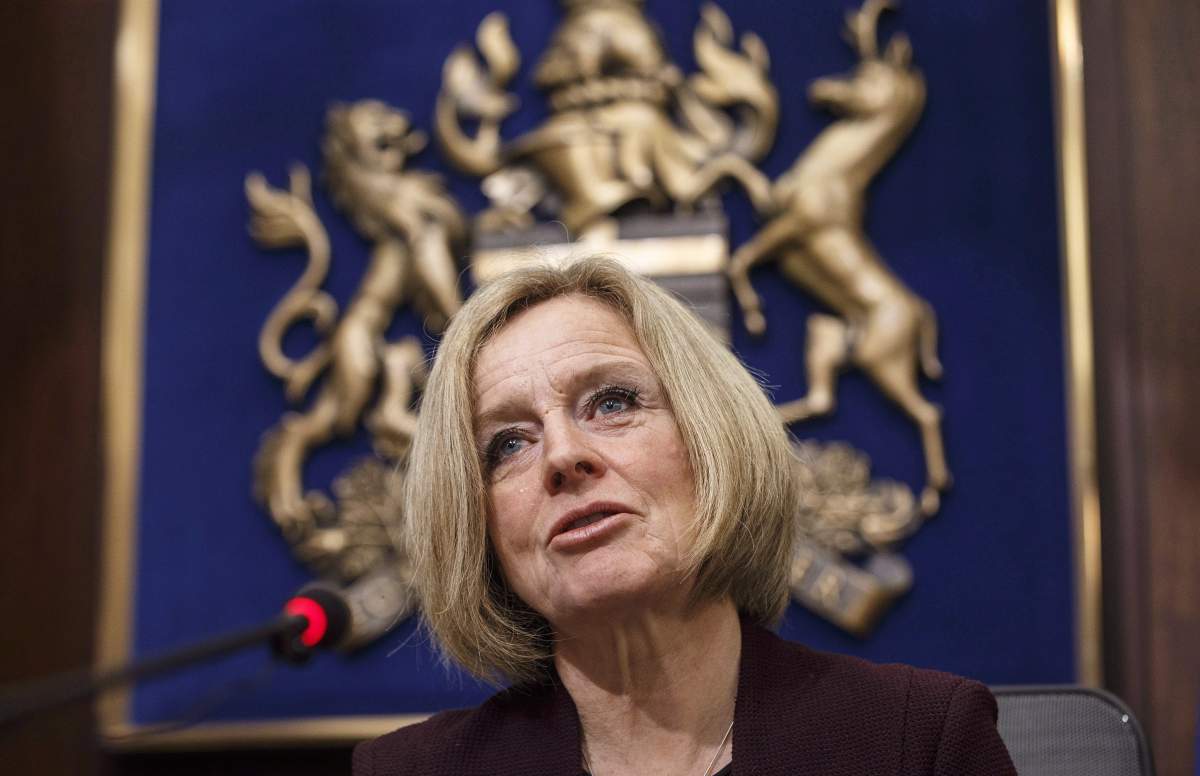With an unspecified provincial election date on the horizon, a recent poll showed that the United Conservative Party held a significant 25 per cent lead over the governing New Democratic Party.

But Premier Rachel Notley’s approval ratings have improved since November, according to the findings.
The poll, conducted by Mainstreet Research by phone between Jan. 15-16, showed that 52.3 per cent of decided and leaning voters would vote for Jason Kenney’s UCP. Just under 28 per cent of those polled would vote for a repeat NDP government, 7.7 per cent would vote for the Alberta Party, 6.1 per cent would vote Liberal, three percent would vote Green and 2.4 per cent would vote for the Freedom Conservative Party.
Of the 893 Albertans surveyed, 10.8 per cent were undecided.
“Polls for well over a year and a half have consistently shown a large lead for the UCP over the NDP,” Mount Royal University political science professor Duane Bratt told The Morning News on 770 CHQR.
When those decided and leaning voters were broken down by geographic area, respondents outside of Calgary and Edmonton showed to be the most likely to vote for the UCP — 67.7 per cent compared to 16.8 per cent for the NDP.
Nearly half of those surveyed in Calgary — 49.2 per cent — said they would vote for Kenney’s party, with the NDP again coming up second at 29.1 per cent.

Get daily National news
In Edmonton, the gap narrows to single digits, with 41 per cent of survey respondents saying they would vote for the UCP and 37.4 per cent saying they would vote for the NDP.
LISTEN: MRU’s Duane Bratt joins The Morning News to discuss the recent allegations against Jason Kenney and Tuesday’s Mainstreet Research poll results
Decided and leaning men surveyed were much more likely to vote for the UCP: 63.5 per cent to 22.9 per cent. But women of the same group were much closer: 41.3 per cent for the UCP compared to 32.7 percent for the NDP.
The public sentiment captured in this poll will be difficult for the NDP to change, Bratt said.
“When you’ve seen those sorts of numbers consistently strong for as long as they’ve seen it, it’s going to be very tough to reverse them.”
“I think we’re looking at an election campaign where it’s about the NDP trying to hold on to as many seats as they can as opposed to trying to win the election.”
The poll also asked about the favourability ratings of five of the party leaders and found that Notley has a -12.4 per cent net favourability rating while Kenney has a +6.6 per cent rating.
In a statement, Mainstreet Research president and CEO Quito Maggi said these numbers are an improvement for Notley.
“In November we found a 35 per cent gap between Notley and Kenney in terms of net favourability, but this month the gap between the two has narrowed to 19 per cent,” Maggi said.
Taking the 3.28 per cent margin of error into account, the number of Albertans with positive opinions of Notley and Kenney were nearly even — 36.9 and 39.7 per cent, respectively. But respondents outside of Edmonton and Calgary overwhelmingly supported the UCP leader.
A provincial election must take place between March 1 and May 31, according to Alberta’s fixed-election-date legislation.
The spring sitting of the Alberta legislation is set to start on March 18, with many expecting an election writ to drop soon after.
The margin of error for this poll is +/- 3.28% at the 95 per cent confidence level. Margins of error are higher in each sub sample.
- They ‘ran into gunfire’: Impact of the Tumbler Ridge shooting on first responders
- Tumbler Ridge shooting fuels misinformation about trans people, organization says
- Soaring number of fatal crashes in Calgary already on pace to top last year
- Calgary police charge nail salon employee with sexual assault











Comments
Want to discuss? Please read our Commenting Policy first.